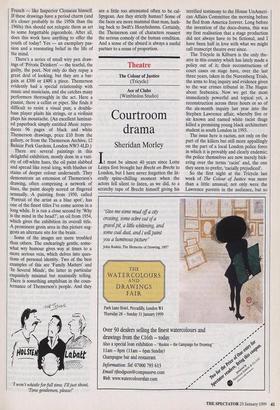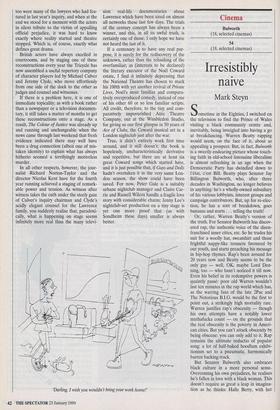Theatre
The Colour of Justice (Tricycle) Ace of Clubs (Wimbledon Studio)
Courtroom drama
Sheridan Morley
It must be almost 40 years since Lotte Lenya first brought her Brecht on Brecht to London, but I have never forgotten the lit- erally spine-chilling moment when the actors fell silent to listen, as we did, to a scratchy tape of Brecht himself giving his terrified testimony to the House UnAmeri- can Affairs Committee the morning before he fled from America forever. Long before the invention of the docu-drama, this was my first realisation that a stage production did not always have to be fictional, and I have been half in love with what we might call transcript theatre ever since.
The Tricycle in Kilburn is the only the- atre in this country which has lately made a policy out of it; their reconstructions of court cases on stage have, over the last three years, taken in the Nuremberg Trials, the arms to Iraq inquiry and evidence given to the war crimes tribunal in The Hague about Srebenica. Now we get the most immediately powerful and topical yet, a reconstruction across three hours or so of the six-month inquiry last year into the Stephen Lawrence affair, whereby five or six known and named white racist thugs killed a promising young black architecture student in south London in 1993.
The issue here is racism, not only on the part of the killers but still more appallingly on the part of a local London police force in which it is provably and clearly endemic; the police themselves are now merely bick- ering over the terms 'racist' and, the one they seem to prefer, 'racially prejudiced'.
So the first night at the Tricycle last week of The Colour of Justice was more than a little unusual; not only were the Lawrence parents in the audience, but so too were many of the lawyers who had fea- tured in last year's inquiry, and when at the end we stood for a moment with the actors in silent tribute to the victim of appalling official prejudice, it was hard to know exactly where reality started and theatre stopped. Which is, of course, exactly what defines great drama.
British actors have always excelled in courtrooms, and by staging one of these reconstructions every year the Tricycle has now assembled a useful repertory company of character players led by Michael Culver and Jeremy Clyde, who move effortlessly from one side of the dock to the other as judges and counsel and witnesses.
If there is a problem here, it is one of immediate topicality; as with a book rather than a newspaper or a television documen- tary, it still takes a matter of months to get these reconstructions onto a stage. As a result, The Colour of Justice was already up and running and unchangeable when the news came through last weekend that fresh evidence indicated there may well have been a drug connection (albeit one of mis- taken identity) to explain what has always hitherto seemed a terrifyingly motiveless murder.
In all other respects, however, the jour- nalist .Richard Norton-Taylor and the director Nicolas Kent have for the fourth year running achieved a staging of remark- able power and tension. As witness after witness takes the oath under the steely gaze of Culver's inquiry chairman and Clyde's acidly elegant counsel for the Lawrence family, you suddenly realise that, paradoxi- cally, what is happening on stage seems infinitely more real than the many televi- sion real-life documentaries about Lawrence which have been aired on almost all networks these last few days. The trials of the century concept has always been a winner, and this, in all its awful truth, is certainly one of those; I only hope we have not heard the last of it.
If a centenary is to have any real pur- pose, it is surely for the rediscovery of the unknown, rather than the rehashing of the overfamiliar; as (interests to be declared) the literary executor of the Noel Coward estate, I find it infinitely depressing that the National Theatre has chosen to mark his 100th with yet another revival of Private Lives, Noel's most familiar and compara- tively overproduced comedy, instead of one of his other 60 or so less familiar scripts. All credit, therefore, to the tiny and com- paratively impoverished Attic Theatre Company, out at the Wimbledon Studio, for giving us our first glimpse in 50 years of Ace of Clubs, the Coward musical set in a London nightclub just after the war.
True, it didn't entirely work first time around, and it still doesn't; the book is hopelessly, uncharacteristically derivative and repetitive, but there are at least six great Coward songs which started here, and it is just possible that, if Guys and Dolls hadn't overtaken it in the very same Lon- don season, the show could have been saved. For now, Peter Gale is a suitably urbane nightclub manager and Claire Car- rie and Russell Wilcox handle a fragile love story with considerable charm; Jenny Lee's nightclub-set production on a tiny stage is yet one more proof that (as with Sondheim these days) smaller is always better.
`Darling, I wish you wouldn't bring your work home!'



























































 Previous page
Previous page